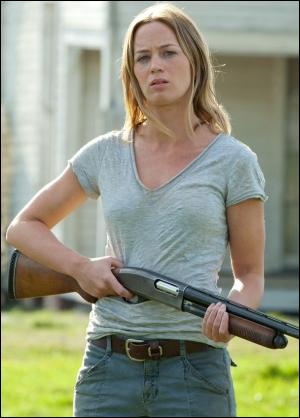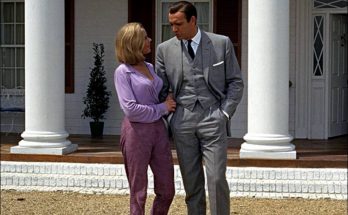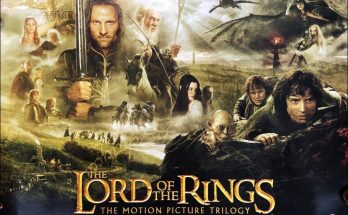Looper: Making a moral choice for the future. A hit man named Joe (Joseph Gordon-Levitt) discovers that his next target is his future self (Bruce Willis) in Looper, a mind-bending and time-bending thriller from writer-director Rian Johnson. The film takes place in 2044, when time travel doesn’t exist yet – but thirty years down the line, it will, and it will be controlled by gangsters for one purpose. As Gordon-Levitt explains, “The gangsters use time travel to kill people – they zap their victim back to the past, where a hit man called a Looper, employed by the future gangsters, assassinates them and disposes of the body.”
The trouble for Joe comes when he “lets his loop run,” says Willis. “Letting your loop run means that you’ve shown up to work, your older self has appeared in front of you, and – for whatever reason – you’ve let your older self escape. It doesn’t happen often, because if all goes correctly, your older self should have a sack over his head and be gagged and tied. You should just shoot him without knowing what you’re doing. But my character shows up in front of his younger self untied and no sack over his head. I get the drop on him and escape.”
Looper re-teams Gordon-Levitt with Johnson, who have remained good friends since filming the independent hit Brick some years ago. “Rian and I first met nearly ten years ago,” says Gordon-Levitt. “It wasn’t too long after we shot Brick that he started telling me about his idea for Looper, He ended up writing the lead character for me, which is the first time that’s ever happened to me as an actor, so to play that was a great honor.”
“When Joe and I first spoke about Looper, just after we made Brick, it was just the premise of the movie,” says the writer-director. “What I liked about the idea was the predicament that Joe finds himself in – he knows what the future holds, and he has to make a moral choice about which way it’s going to go.”
Willis’s character is motivated by just how bad things have gone in the future. If the 2040s are a future where things are run down and everything has gone slightly wrong, the 2070s are marked by the change in control of the organized crime syndicates. “Everything is under the control of a guy called The Rainmaker,” says Willis. “He’s orchestrating mass executions – a reign of terror. But my character knows where the Rainmaker lives in Young Joe’s time. When I go back in time, I go on a mission to track down the Rainmaker and fix the future. Of course, nothing is as easy or as simple as it seems.”
Producer Ram Bergman – who previously produced Johnson’s first two films, Brick and The Brothers Bloom – says that working with a writer-director like Johnson is a rare treat. “He’s just so talented, unique, and nice,” says Bergman. “The dynamic is that Rian tells me an idea and then he goes and develops it. We go back and forth on a few drafts, and when we feel like the draft is ready to go, we figure out how to make the movie – and to make it in a way that Rian can do it the way he wants to do it. It’s our job to support his vision and help him make it a reality.”
Producer James D. Stern also re-teams with Johnson, after joining with Bergman to produce Johnson’s The Brothers Bloom. “Rian is a singular voice. That’s what makes him so special. He always maintains a unique take on the world he’s creating and doesn’t sacrifice what he wants to accomplish,” says producer James D. Stern. “People know the real thing when they see it, and that conversation between artist and audience is critical. When I first read Looper, I was not only eager about the prospect of working with Rian again (as well as Ram), but also thrilled to jump into a film that not only has so many twists and turns, but also is so rich with layers and meaning.”
In creating the time-travel story, Johnson kept things simple. “You get put into the machine in the 2070s and you get sent back – bang! – thirty years to a predetermined site,” he explains. “The time machine is set at a fixed interval – you can’t dial it up or down,” says Johnson. “So as time keeps going forward in 2074, the point a person is going to be sent back to the 2040s keeps sliding forward as well.”
Johnson also set up a world in which time travel has been outlawed, so it isn’t necessarily fully understood or researched – the only thing the mobsters know is that it works. In fact, “The smartest men in the future know one thing: they know to be scared to death of it,” says Johnson. “That’s part of the reason it was outlawed – grandfather paradoxes, butterfly effects… nobody really knows what would happen. All they know is that it’s incredibly dangerous and they shouldn’t be messing with it, and even the mob will only mess with it in this one particular way. That’s one of the reasons why it’s so important that loops sent to be closed get closed: this person from the future is now loose. Who knows what the consequences could be.”
“The movie was completely in Rian’s head,” says Stern. “He knows exactly how he wants to cut the film, how he wants the film to look. He knows every shot, every day. When I came to New Orleans, where we shot the movie, every single person in the production office had a book with all the storyboards. Every single person knew every single shot in the movie. It was amazing, and it’s a real tribute to Rian.”
At the center of the film are the Loopers – the low-level hit men assigned to rub out the victims of the future mob. “Loopers are not the most forward-thinking guys,” says Gordon-Levitt. “Your victim appears out of nowhere, hogtied, and you just have to shoot him. All it takes is the willingness to risk your life, because eventually, the future gangsters will ‘close your loop’ and send your future self to be your next victim.
The Loopers’ weapon of choice is the Blunderbuss. “It’s designed for what a Looper does, which is to shoot a hogtied man from ten feet away,” says Gordon-Levitt. “It doesn’t have any range or accuracy – you can’t hit anything far away, but you also can’t miss anything if it’s close.”
“The Blunderbuss is an awful gun,” says Johnson. “It’s basically a metal tube that can cough out a couple of shots. But if a guy shows up in front of you, hogtied, with a sack over his head, and you’ve got to kill him, it’s the gun that’s made for the job.”
“The Loopers aren’t really good killers – they’re more like technicians,” says Paul Dano, who plays one of Joe’s fellow Loopers. “The mob has made it as simple as possible – like working in a factory line where all you do is pull a lever.”
Compare these low-level gangsters with the more talented Gat Men – trained killers with better weapons to show for it. “Gat men are the muscle for the main mob in the present day,” says Johnson. “If the Loopers are the low men on the totem pole, the gat men are the real muscle that run the city. Gat men have these huge, very accurate revolvers – precision weapons. They’re very easy to clear if they jam – they’re big, imposing guns that you do not want to mess with.”
Views: 93




